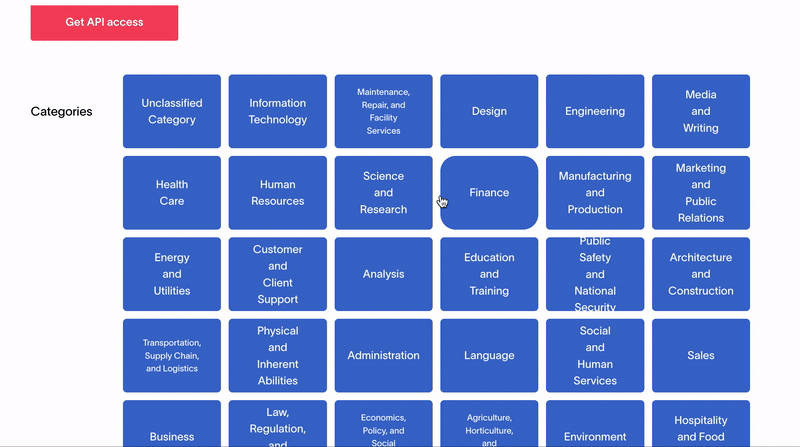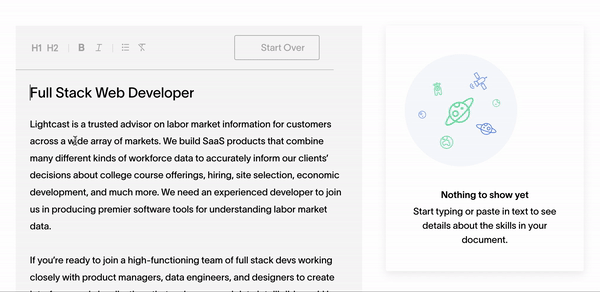
The only skills taxonomy you need. Free to use and ready right now.
A comprehensive, current, crowd-sourced common skills language. Our free and accessible library of 33,000+ skills comes from real-world use cases, honed by in-house experts, so you don't have to create a list yourself or rely on one you can't trust.
For skills to be useful, everyone needs to understand what everyone else is saying.
Nobody can fully understand a job without understanding the skills it requires—meaning a skills-based approach is crucial for everyone at every level of the labor market.
The Lightcast Skills Taxonomy delivers clarity by allowing everyone to speak the same language. Use our free API to articulate your skills needs, and leave the details to us: our dedicated team of taxonomists and engineers cleans, checks, and updates each entry so that you always have the most accurate and up-to-date picture of the labor market.
The Lightcast Skills Taxonomy is freely available because we believe in using data for good and creating a labor market that works for everyone. Through the shared language of skills, we can enable a world where every worker and every job can find their best fits as efficiently as easily as possible.

Ready to get started?
Access and plug in our skill library of over 33,000 skills. Each has a unique machine-readable identifier and has been identified in real-world job postings and profiles, refined by our human experts. All for free.
We'll be honest: Lightcast Skills isn't the only library available to use. There are guides and tools available to build your own, and The World Economic Forum has an interactive taxonomy available as well. The advantage of the Lightcast Skills Taxonomy is that it’s based in the real-world and easily accessible right away–and if you need to add something specialized to your organization, we can add it. Just like the library itself, submissions are open.
With every release, new skills are added to the Lightcast Skills Library–defined and assessed by in-house experts. Adding skills so frequently is how we stay on top of emerging trends in the labor market and stay ahead of slower releases like those from government agencies.
But don't take our word for it—the Skills Library Changelog is freely accessible, so you can see exactly what we've been up to. You can also read more about how our data taxonomies are organized.

Lightcast Skills Taxonomy: Under the Hood
Lightcast Skills is created by a team of economists and labor market analysts who have worked with real-time labor market data for over 20 years. Nobody knows skills better.
We’ve gathered over 33,000 skills from hundreds of millions of online job postings and profiles from multiple sources—more than any other data provider. We also meticulously clean up and fact-check each skill before adding it to the library.
Each skill has a machine-readable, unique, identifiable skill ID. Use our free skill-tagging prototype to translate your syllabus, resume, or your job posting into the common language of skills.
We’re constantly updating our skills library so it reflects the latest changes in the labor market. We add new skills, remove old ones, and tidy up terminology as necessary.
We love collaboration and need your help. Don’t see a skill? Suggest a new skill.
Send one or more skills to the API and it auto-populates related skills that show up together in the real world. This feature is limited to 50 free API calls per year.
Every skill has its own unique page in the Lightcast Skills Taxonomy. Each page displays related skills, the top job titles and top companies posting for that skill, the job postings trend line over the last twelve months, and live job postings that you can click into to view that skill in real time (and most also have a Wikipedia definition for further clarity). Here's an example page for Javascript Programming Language Skills.
Skill categories and subcategories act as a way to logically group the skills in our library and create a hierarchy to easily view related skills. Categories are broad areas of expertise that map to career areas, and subcategories provide a group of skills specific to performing a specific aspect of a job. Learn more about Lightcast data taxonomies.
Using the Lightcast Skills Taxonomy can be the first step to becoming a skills-based organization, but it's up to you. We're happy to provide exactly as much data as you need for however long you need it.
Try it out! Explore the tools on this page to see what the Lightcast Skills Taxonomy can do.
Skills Library
Looking for a specific skill? Search our library for free. Explore 33,000+ skills that we’ve collected from hundreds of millions of job postings, resumes, and online profiles.
Skill Categories
No skill exists on its own: explore our 30+ skill categories as a way to logically group the skills in our library and create a hierarchy to easily view related skills.

Skills Extractor
Our skills tools can parse text to identify useful and in-demand skills in your job postings, resumes, or syllabi. Make sure you're speaking the language of the labor market: it's free to use.

More To Explore
Our skills solutions don't end with the library API. Everyone involved with the labor market at any level—from individuals and educators to communities and businesses—can put skills to work. There's more to explore.
- Why would I want my data to speak your language?
It’s the advantage of comparing apples to apples. Using Lightcast skills allows you compare your data against the entire labor market, as seen through our massive database of postings, resumes, and profiles. We also do the tidying up: our dedicated team removes duplicates and corrects misspellings so you don’t have to.
- Why do I need a skills library?
If you’re not already using one, odds are that someone at your organization is. Everyone needs to start with skills when approaching the job market, whether that’s in designing curricula, planning development, or keeping up with workforce capabilities (“How many people on our sales team are Salesforce Trailhead certified?”). Sometimes, different departments have their own specialized libraries—using just one across an entire organization reduces miscommunication and maximizes efficiency.
- How are skills defined?
Most skills come with a descriptive definition. All skills in our library reflect their current common usage, and we include a Wikipedia link to help with that definition wherever possible, distributed under the CC BY-SA license.
In addition to grouping skills by similarity, we also sort them according to three classifications:
Common Skills are prevalent across many different occupations and industries, including both personal attributes and learned skills. (e.g. "Communication" or "Microsoft Excel"). These include soft skills, human skills, and general competencies.
Specialized Skills are more specific They’re primarily required within a subset of occupations or equip one to perform a specific task (like "NumPy" or "Hotel Management"). These are sometimes known as technical skills or hard skills.
Certifications are recognizable qualification standards assigned by industry or education bodies (including “Cosmetology License” or “Certified Cytotechnologist”).
- How often does the library change?
Monthly; each release contains new skills and updates to how existing skills are identified. You can visit the changelog to see what each update looks like.
- How are skills selected for inclusion?
We select skills that we know are relevant to people, employers, and educators—meaning, they are commonly listed on real-world resumes, professional profiles, and job postings. We gather and analyze millions of these skills each month and also take suggestions from the community. You can suggest a skill.
- Why offer an API instead of something like an Excel file?
Using an API as opposed to a downloadable list gives you access to the most up-to-date dataset, while a static downloadable list would be out of date very soon—skills are constantly changing (and our library is updated monthly).
- Why has Lightcast made its skills library free?
We believe that a common language is the best way forward for the whole system for people, education providers, and employers. Our hope is that by making this library freely available, we can help jobseekers identify the skills they need to get the job they want, help employers save time and money finding skilled candidates, and help educators provide relevant and specific courses.
- What’s the difference between this and O*NET?
Top-down, highly structural approaches like O*NET are useful for seeing long-term trends, but difficult to maintain and keep relevant as the world of work keeps changing. The Lightcast library is faster and more agile.
- What terms apply? Can I use this service in a commercial product?
The Lightcast Open Skills Library is free for individual and not-for-profit use, as long as you attribute Lightcast and abide by our policies. Here are the Terms and Conditions.
